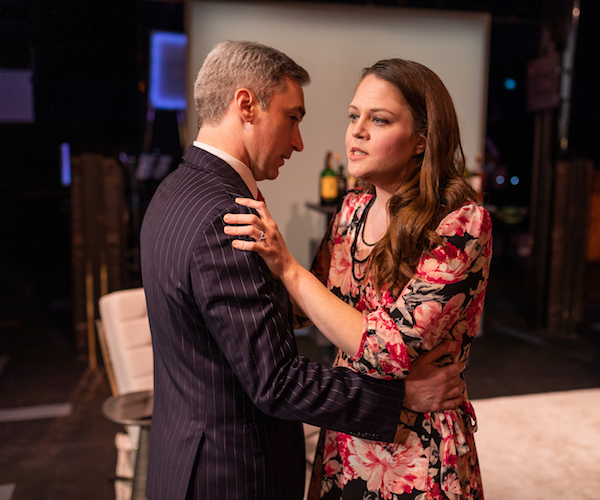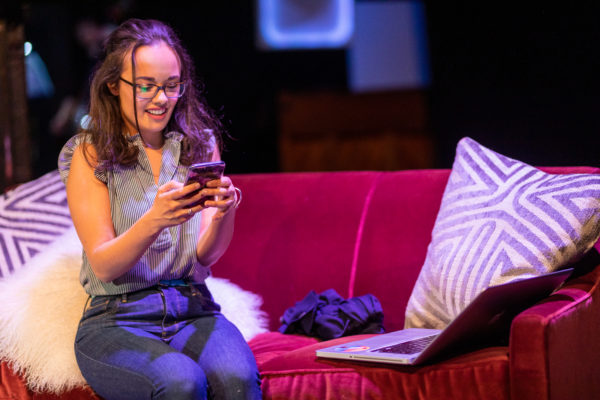Opera Review: MassOpera’s “Die Fledermaus” — Modern Life, Lampooned
By Katrina Holden-Buckley
MassOpera’s updated version of Die Fledermaus pulls off a major feat.
Die Fledermaus, composer, Johann Strauss, librettist, Sarah Ina Meyers. Directed by Cassie Lovering. Conducted by Daniel P. Ryan. Staged by MassOpera is at the Plaza Theatre at the Boston Center for the Arts, Boston, MA, through April 13.

Stefan Barner as Eisenstein and Kelley Hollis as Rosalinda in MassOpera’s production of “Die Fledermaus.” Photo by Nile Scott Studios; courtesy of MassOpera.
You tolerate the plot of Johann Strauss’s oft-produced operetta Die Fledermaus for the sake of a few laughs and a chance to hear some hummable Viennese waltzes. And if that was the expectation for this MassOpera production, the cast’s fine voices and well-timed comic moments provided the goods.
But this Die Fledermaus, with a new English translation by Sara Ina Meyers, pulled off a major feat. It draws us in by updating the action, turning the opera’s 19th century caricatures into creatures that inhabit today’s media-crazed, star-obsessed America. By turning the piece’s figures into the shallow, self-aggrandizing influencers that rule social media and populate Reality TV, the staging makes some deftly satiric statements about ego in the era of Twitter. In fact, the opera works splendidly when its characters are people we love to hate. The best adaptations cast the vision of the original material in a new light and make comparisons between both cultural eras. Suddenly, the married couple’s distaste for one another doesn’t seem so ridiculous when we know how viscerally their career is their groomed image. Where does image end and real life begin? The party in the second act is tailor made to be a place where one sees and lives to be seen. The bottom line: we haven’t evolved in substantial ways from the Viennese elite the opera mocks.
Graphics were used to great effect during the overture, presenting cast members in a TV show credits scroll, via a chic nouveau-1990’s style. When Orlofsky’s party comes up, gossip news scrolled on the screen, introducing us to press photos of an androgynous Lady Gaga or Prince type superstar. Images of text messages between characters would sometimes appear on screen to great effect, though there were a few times when the writing was too small and/or the gifs were a bit too obscure to be read quickly enough.
Some small chunks of clunky dialogue threatened the impression of the setting in contemporary New York. The scene in which Eisenstein and Falke reminisce about their college days doesn’t prove very shocking or funny for today’s audience, though the performers did their best to sell it. Purists used to the Schirmer translation may be thrown off by the omission of certain tried and true conventions, but the changes didn’t do all that much harm — for example, “A toast! A toast!” became “And so! And so!”
The Plaza Theatre at the Boston Center for the Arts presents ensemble problems musically. The reduced orchestra was set behind the action through a scrim, and actors were required to play to 3 sides of the audience throughout this busy piece while also keeping an eye out for the monitors. This proved to be more difficult for some singers than others; there were at least two nerve-wracking moments when the singers and the orchestra were markedly out of sync. The fine group of instrumentalists was led capably by Daniel P. Ryan. It should be noted that some tempi were extremely brisk, particularly the champagne trio. Singers were up for the challenge but it didn’t need to be so unnecessarily rushed.
The pieces in the set were donated by furniture retailer Mitchell Gold + Bob Williams. Some lucky audience members were seated in plush couches, alongside cast members — and champagne was offered at both intermissions. Costumes by Bridgette Hayes added some clever humor to the story, particularly in the traditionally masked ball scene. There were nods to Old Hollywood: Orlofky’s costume get together was inspired by “Gatsby” themed parties, which are quite popular these days. A projection of Vivien Leigh proceeded Rosalinda’s entrance in a feather-accented red gown; a Southern accent complimented her disguise. Adele’s party costume was a nod to Marilyn Monroe’s flapper style in Some like it Hot. Eisenstein’s Sherlock Holmes getup became the punchline for several jokes, including Rosalinda’s identity reveal in Act 3: “No shit, Sherlock!”
The cast’s diction was very clear throughout and this is important because there were no supertitles. Director Cassie Lovering crafted assured and comfortable delivery of the comic dialogue, with amusing gags at every turn.
Stefan Barner as Eisenstein was both vocally sparkling and a comic standout. His timing made the most of his most trivial lines, and his facial reactions supplied plenty of bemused commentary. Ann Fogler as Prince Orlofsky was extremely impressive, her robust vocals capable of adroit agility.

Brianna Meese as Adele in MassOpera’s production of “Die Fiedermaus.” Photo: Nile Scott Studios; courtesy of MassOpera.
This version’s treatment of Rosalinda, re-cast as “An Actual Housewife,” per the popular Bravo series iterations, and her personal assistant Adele made these characters especially relevant. There is a sense that we have seen these people on TV and in real life. Kelley Hollis, a staple of the local opera community, plays Rosalinda, and she continues to impress with her thrilling upper range. Her Czardas was a highlight, with the ensemble supplying a hilarious contemporary booty dance alongside it. Brianna Meese was adorable as the young but shrewd Adele — there was a glittering timbre in her arias.
In supporting roles, Mitch FitzDaniel and Jeremy Fisher as Falke and Blind were great supplements to the night’s comedy. Colin Campbell was appropriately insufferable as the preening, opera-warbling ex-boyfriend, Alfred. As Deputy Frank, the aspiring film director, Timothy Gorka emphasized the character’s more naive and enthusiastic side, but the effect was endearing. Pier Lamia Porter, in the speaking role of Ida, was particularly adept at dropping in unexpected laugh lines.
In this adaptation, Rosalinda and Eisenstein reconcile after a frank conversation about how Rosalinda prioritized their outward image as a couple over the reality of their marriage. The notion of iPhone as trivializing appendage ends with her temporarily amputating social media from their lives. Though I have seen Die Fledermaus several times, I can’t tell you how this varies from the typical ending. I know that they reconcile, but the details of this are muddled because I have usually stopped paying attention to the thin plot past the middle of Act 2. This is about as close to a coherent message as could be wrung out of this piece. In collaboration with the librettist, MassOpera has blown the dust off a creaky antique about the misbehavior of Viennese socialites: now the spirit of the opera is nothing if not timely — a look at the absurdity of life in America today.
Katrina Holden, soprano, has appeared with Boston Lyric Opera, Odyssey Opera, MassOpera, and Connecticut Lyric Opera, as well as in concert throughout the country and abroad. A graduate of The New England Conservatory and Muhlenberg College, she has written for Boston Singers’ Resource, Classical Singer Magazine, and The Theatre Times.
